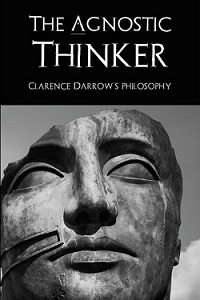|
TRANSLATE THIS ARTICLE
Integral World: Exploring Theories of Everything
An independent forum for a critical discussion of the integral philosophy of Ken Wilber
 Andrea Diem-Lane is a tenured Professor of Philosophy at Mt. San Antonio College, where she has been teaching since 1991. Professor Diem has published several scholarly books and articles, including The Gnostic Mystery and When Gods Decay. She is married to Dr. David Lane, with whom she has two children, Shaun-Michael and Kelly-Joseph. Andrea Diem-Lane is a tenured Professor of Philosophy at Mt. San Antonio College, where she has been teaching since 1991. Professor Diem has published several scholarly books and articles, including The Gnostic Mystery and When Gods Decay. She is married to Dr. David Lane, with whom she has two children, Shaun-Michael and Kelly-Joseph. The Agnostic ThinkerForeword to a book on Clarence Darrow's PhilosophyAndrea Diem-Lane
It is perhaps inevitable that the only honest position one can hold and still be true to the spirit of science is, in fact, agnosticism.
When Spencer Tracy, playing Clarence Darrow in the movie Inherit the Wind, takes the Bible in one hand and On Origin of Species in the other and clasps them together side by side to illustrate how science and religion can work together, one is led to assume that Darrow was indeed a theist evolutionist. But was he? Hollywood's portrayal of him in this classic film is obviously suspect. Instead of supporting theism, Darrow's own writings clearly show his strong support for agnosticism (literally, “not knowing”). This philosophical position--the argument that one cannot know ultimate or metaphysical truths or even whether there are any--fits in line with the teachings of Socrates, Hume, Darwin, Einstein and many other philosophers and scientists today. Science is inherently agnostic. As a discipline it tends to only investigate those claims that can, in theory, be tested and proven. Indeed, Karl Popper, a well known philosopher and historian of science, has stressed that for some- thing to be of scientific merit it must be potentially falsifiable. In other words, science doesn't work by proving itself right, but rather by demonstrating where, when, and how it can potentially be wrong. In this way, it can actually correct prior assumptions and make further testable hypothesis, which can either withstand rational scrutiny or be shown to be lacking in sufficient evidence. When a metaphysical (above or beyond the empirical world) claim is made, however, there is usually no way to test it and prove beyond a reasonable doubt that such a thing actually exists. Believing it to be so is insufficient in the realm of science. There have been many attempts to prove the existence of God, outside of merely quoting the authority of a supposed revealed scripture such as the Bible or the Koran. Thomas Aquinas, for instance, looked at nature for signs of God. And everywhere he looked he saw Him. As he opined “How can there be design in nature without a designer.”? Obviously, reasoned Aquinas, God must therefore exist. But for all his yeomanly efforts, as outlined in his five arguments for the existence of God (ranging from the cosmological to the teleological), none of proofs held, as David Hume so brilliantly illustrated. Interpreting the magnificence of a flower as evidence of a higher being falls short of what is demanded as proof in science. While one might see design in nature, another can witness a maelstrom of haphazard organic parts only temporarily resisting chaos and all too soon succumbing to entropic death. Naturally, a question arises: Does the theory of evolution necessitate an agnostic worldview? Or, can one believe in theism and still be an evolutionist such as Kenneth Miller, author of Finding Darwin's God? Yes, one can personally believe in any religious idea one wishes to and even connect such to a scientific paradigm. But saying this also means that one could attach any sort of nonsense to science and try to suggest that they are not in conflict. I could, for instance, say that believing in Gumby and Pokey as Divine Avatars (famous animated claymation figures popular on American television) doesn't conflict with Darwin's idea of natural selection. But making such a banal statement doesn't then justify claiming that one's chosen religious belief is a legitimate scientific position that warrants equal treatment in a Biology course. As Carl Sagan rightly said, “extraordinary claims demand extraordinary proof.” And since religion, in general, is either unwilling or unable to provide such proofs to the scientific community, it is perhaps inevitable that the only honest position one can hold and still be true to the spirit of science is, in fact, agnosticism. Clarence Darrow, even though not trained as a scientist but rather as a lawyer, realized this truth early on and became a tireless champion of allowing the “unknowing” postulate in science to permeate into one's daily life. As he himself so wittingly observed, “An agnostic is a doubter. The word is generally applied to those who doubt the verity of accepted religious creeds of faiths. Everyone is an agnostic as to the beliefs or creeds they do not accept. Catholics are agnostic to the Protestant creeds, and the Protestants are agnostic to the Catholic creed. Any one who thinks is an agnostic about something, otherwise he must believe that he is possessed of all knowledge.”
“The fear of God is not the beginning of wisdom. The fear of God is the death of wisdom. Skepticism and doubt lead to study and investigation, and investigation is the beginning of wisdom.” (Clarence Darrow, "Why I Am An Agnostic", 1929)
|
